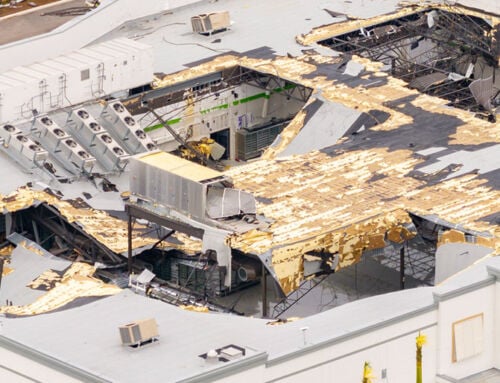Throughout the coronavirus pandemic, the construction industry has had to pivot on a dime, dealing with everything from labour and supply shortages to an increased focus on sanitation protocols and physical distancing. As the economy starts to recover, these issues will still be front and centre — along with some new post-pandemic precautions.
Dealing with delays and shortages
First off, there’s a shortage of labour. “It’s very difficult to find a contractor, let alone a qualified contractor,” says Fred Muldowney-Brooks, Vice President of Risk Services at Federated Insurance. Many skilled tradespeople left the industry during the pandemic, so there’s a shortage of certain skillsets on jobsites. In some cases, general contractors are faced with hiring less qualified personnel, which in the long term could impact quality of work.
That’s combined with shortages or delays of certain materials, such as lumber. A number of sawmills, for example, have been forced to reduce operations during the pandemic; now, many are temporarily shuttered because of wildfires which are, of course, burning the same resource needed. Lumber is in short supply — and even if construction companies can get their hands on it, prices have skyrocketed. What used to cost $1 or $2 per linear foot now costs closer to $13 or $14 per linear foot. At the same time, they need to ensure they’re obtaining the right material for the architectural design or engineering specs of the project — not just whatever happens to be available — which comes down to quality control and due diligence.
Living in a global economy, there are all the other materials, equipment, and parts that might also be in short supply, depending on the location of the manufacturer or supplier. If the items are being shipped from overseas, there’s a good chance they could be stuck in a cargo container somewhere in the Atlantic or Pacific. That can lead to overall project delays.
“We see a lot of backorders on materials — so now maybe with backorders construction companies can’t deliver the project for another month or two. In Quebec, there are cement shortages, so when there’s a construction site wanting to get cement delivered, they can’t get it for a couple of weeks,” says Simon Marcoux, Senior Consultant in Risk Services at Federated Insurance.
All of these factors impact jobsite security. While theft has always been a concern on jobsites, especially with specialized equipment and tools, that risk could be amplified when certain scarce materials are in high demand.
“If the price of lumber has gone up so significantly, you need to make sure that your security procedures reflect that, such as enhancing remote site surveillance systems,” says Muldowney-Brooks.
Adds Marcoux: “Security is changing — we see more camera systems and intrusion alarms. It’s becoming a bit more frequent to see them, but it’s not just because of COVID. Technology is changing so it’s less expensive to install these kinds of systems.”
Doing your due diligence
In addition to securing your jobsite, making sure that corners aren’t cut because of labour or material shortages is especially important. That means continuing quality assurance inspections to ensure that contractors and subcontractors are doing the work properly, and are doing it according to the local building code requirements, architectural design or engineering specs of the project.
If, for example, a subcontractor decides to swap out one material for another because of availability issues, due diligence involves ensuring the change request is approved either by the architect, the engineers, or the project manager before going ahead with it.
“What you’re seeing is people taking shortcuts or cutting corners, and instead of reporting the change request, they just go ahead and do it and don’t bother telling anyone. It might not seem like a big deal when they’re doing that, but that’ll set the schedule back if they have to rip it out and redo it again to meet spec or code requirements,” says Muldowney-Brooks.
As the economy starts to open up again, construction companies should ensure they’re hiring tradespeople who are qualified and certified to do the work — and performing their proper checks on any contractors or subcontractors, which could include work performed or materials used.
Policies and procedures should be backed up with documentation. And construction companies should ensure everyone on the jobsite — from managers and supervisors to workers, contractors, and subcontractors — have signed off that they understand and have copies of these policies and procedures.
“Due diligence is a critical thing right now,” says Muldowney-Brooks. “While you’re working to address delayed supplies and the shortage of labour, you can work within the confines you have.”
Ensure your business is protected
One thing that hasn’t changed during the pandemic is the need for insurance to protect your business from risks, both old and new. To learn more about how a comprehensive policy can help protect you, your employees, and your bottom line, visit our Contractors Insurance page today!
This blog is provided for information only and is not a substitute for professional advice. We make no representations or warranties regarding the accuracy or completeness of the information and will not be responsible for any loss arising out of reliance on the information.







